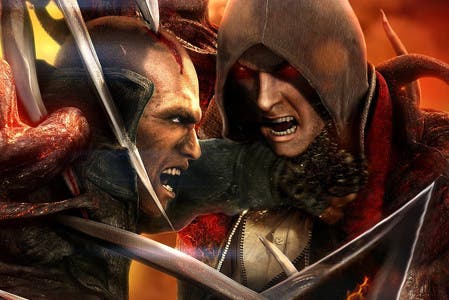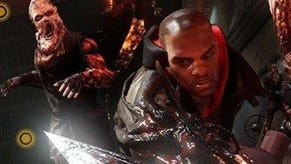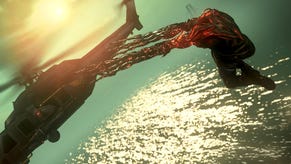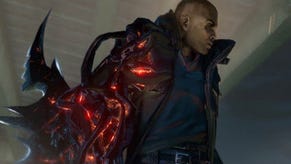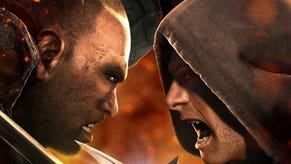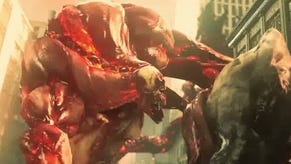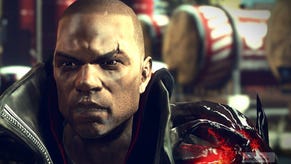Prototype 2 Review
Pleased to eat you.
If you can't be original, at least be excessive. This seems to be the design principle guiding Activision's wonderfully schlocky Prototype series, and while it holds the entire enterprise back from true greatness, perhaps, it at least means your thumbs are in for a decent workout as blood, brain, and all manner of unidentifiable viscera are smeared across New York in the name of - what? Justice? Revenge? Who cares, frankly. I just punched a helicopter into the Chrysler Building.
In Prototype games, you can do that sort of thing all the time, just as you can run up skyscrapers, swallow people in order to assume their form, and turn your body into a kind of fleshy penknife, producing everything from huge blades to rocky hammers (penknives come with hammers, right?). It's a series in which your powers define the fun, and in which both story and setting take a backseat as a result. This is handy, because - even though Prototype 2 has improved things somewhat - the story and the setting still aren't particularly brilliant.
Radical's sequel takes the action back to New York City, which is now known as New York Zero - presumably because it doesn't have any calories in it anymore. There's a new virus turning the place into puddles of squelchy gristle and there's a new main character, too, in the shapeshifting form of James Heller. Heller's objective is to stop this latest toxic outbreak in its tracks and hunt down a heavily infected weirdo named Alex Mercer.
That's a turn up for the books, as he's the guy you played in the first game. It's current protagonist against previous protagonist! This is either a brilliant narratological twist that should have us all writing term papers on the subject or an admission that, after 20 hours of eating pedestrians and sprouting offal from every orifice, Mercer was no longer somebody who we wanted to have round to watch Poirot with on a Sunday evening.
Heller, for what it's worth, feels like an improvement. Due to a swift goring during the opening credits, he has most of Mercer's best powers from the start - such as the ability to glide across reasonably long distances - and, after a slow first hour, he'll be well on his way to becoming a crazy, tooled-up superhero in his own right, packed full of skewers and nasty shivs. The game's rambling prologue fills you in on his years of military service, along with his private life as a good, honest family man, and he's only tipped over the edge when that miserable virus kills his wife and kid, leaving him with nothing to live for except revenge.
He's a touch more engaging than Mercer, in other words, yet your ability to identify with him on a moral or emotional level may be compromised the first time you step outside during a boss fight in order to eat random strangers and top your health back up. Humanising Prototype was always going to be a bit of a struggle, if you ask me; at least the new boy's a better dresser than the last one was (just about), and he's also the world's best swearer. Seriously, you should hear this man drop an F-bomb. Denis Farina can now retire.
Heller's mission sees him unravelling a global conspiracy by racing across New York consuming everyone who might have been involved so as to read their minds and feast on their handy DNA. It all feels a bit like the X-Files for a few giddy missions, and then you start to realise that, once again, the game isn't really presenting a narrative so much as a tasting menu: go here and eat this guy so you can take his identity and get into this room over here, where you can eat this guy, too (maybe after a boss fight, which will generally end with you eating the boss, by the way).
Prototype doesn't feel like a sandbox series in its own right so much as the mad, babbling id of the entire open-world genre.
The backdrop for all this pathological dining, meanwhile, is similarly underwhelming. New York, even when it's been ravaged by various stages of a biohazard outbreak and split into three different parts, is so well-travelled by modern games that it doesn't really make that much of an impact anymore, regardless of whether you can move around it by dashing up walls and wafting through the sky. Two of Prototype 2's trio of self-contained zones are anonymous and rather poky boroughs, while the third, which covers a heavily infected area of Manhattan ranging from Battery Park up to around Columbus Circle, is just a bit too familiar.
The game engine's much better at handling the bigger locations on this outing, however, with a fairly steady frame-rate and a greatly improved draw distance. That second point in particular makes an incredible difference when developers are stringing missions across an open world, and it means that Prototype now feels a lot more comfortable dropping you into the kind of rolling street-to-street set-pieces that already help define InFamous, Assassin's Creed, Crackdown and all those other big hitters that Activision's game has to measure up to.
From the perspective of plot and geography, this sequel is a bit disappointing - but this is Prototype, remember, and it's hard to be disappointed for too long when you can punch a tank until it explodes. When it comes to powers and missions, Radical's on far more stable ground.
Many of Heller's abilities will be familiar to anybody who's spent serious time with Mercer, but they're handled a little more intelligently on this outing. The claws feel a lot less wimpy, the blade's more clearly defined as a slow, heavy option, and treats like the massive Hulk hands and whipfist (the former's my own term, and the latter's basically a nasty hookshot that can slice people in two and yank choppers out of the sky) are delivered nice and late in the day when the enemies are starting to get really tough and you can afford to pack on some overpowered tricks. Prototype 2 chucks in tendrils, as well, allowing you to string people - and certain objects - up and tear them apart, and soon every battlefield's marked with strands of gloopy black webbing for you to navigate.
It's easy to remap powers, meaning that it's painless to experiment with new load-outs, and there are fresh touches everywhere you look: the ability to turn enemies into wonderfully disgusting bio-bombs; a new skill that lets you summon two giant brawlers to fight alongside you; a brilliant hunt mode that has you sending out sonar pulses to track down targets; and a nifty move in which you can tear the gun off a tank and then shoot the tank with its own gun. The world has been waiting for this game for a long time.
The missions turn out to be surprisingly good, too. They're not particularly complex - most of them offer a simple mixture of infiltration sequences in which you have to consume specific targets, street brawling, and the odd moment when you're in control of a helicopter or a tank - but they're all relentless and explosive and gnarly and sweetly ridiculous. The checkpoint placement has been improved and the stealth mechanics are more forgiving now, meaning that theoretically entertaining objectives don't slip into a grind quite as easily as they did in the first game. There's a lovely sense of growing chaos as you fight your way further into the heart of the infection, upgrading your powers and piling on mutation perks while facing off against bigger and bigger nasties.
Where's it all heading? Towards a final sequence that actually comes close to the insane excess of Asura's Wrath, thankfully - while beyond that lurk three islands' worth of decent side quests to complete, lairs (these are very simple dungeons) to clean up, collectables to hunt down and further upgrades to earn. There's even Radnet, if you bought the game brand new. (OK, so Radnet sounds like the kind of name a group of 12-year-old kids would have given to their interlinked walkie-talkie set-up back in the 1980s, but it's actually a selection of weekly challenges and events that allow you to fight your pals for top spot on the leaderboards.)
Radical's refined Prototype, in other words, but it hasn't tamed it. This is still an explosive, exhilarating and sometimes rather exhausting game in which the heroes have sharp hands and bottomless appetites for innocent bystanders and the villains expire in floods of gore and take whole city blocks with them as they go. By this point, Prototype doesn't feel like a sandbox series in its own right so much as the mad, babbling id of the entire open-world genre - with all the inconsistencies and extravagances that implies.
